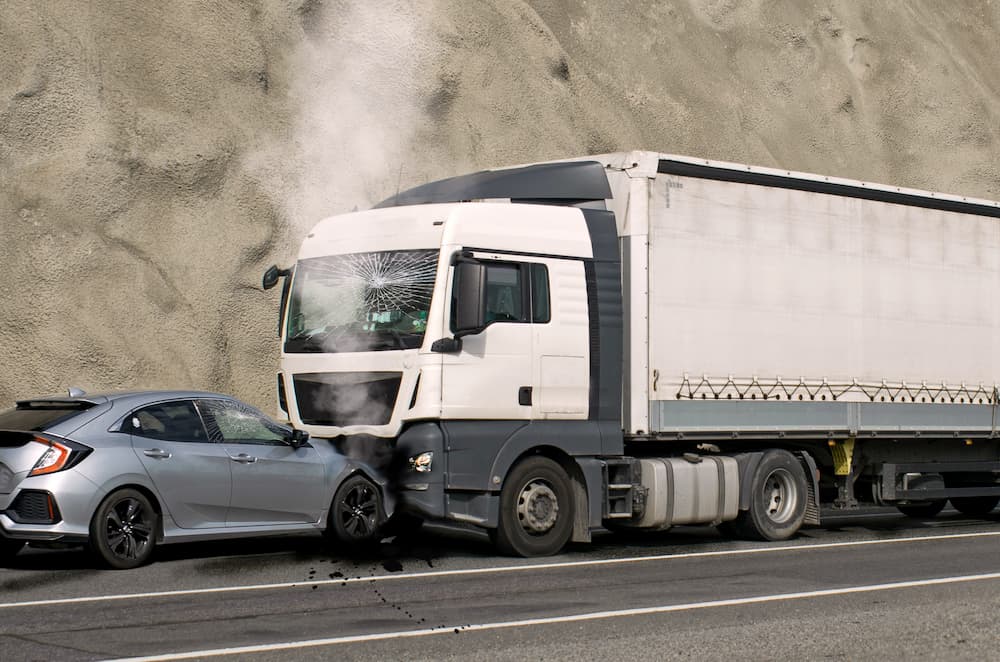- What does commercial auto insurance cover?
- Who needs commercial auto insurance?
- How does commercial auto insurance work?
- How much is commercial auto insurance?
- Exclusions in commercial auto insurance policies
- Top commercial auto insurance companies
- How to choose the right commercial auto insurance for your business
- How to file a commercial auto insurance claim
- FAQs
What does commercial auto insurance cover?
A basic commercial auto liability insurance pays for injuries and property damage you or your employees cause to others in an accident. Bodily injury liability coverage pays for medical bills, rehabilitation and other expenses stemming from their injuries, including legal fees if you get sued. Property damage liability coverage pays for damage to vehicles or property, like a fence, building, or utility pole.
However, liability insurance will not pay for damage to your work vehicles. To protect your company cars, you will also need:
- Collision insurance. This will cover the cost of repairing or replacing your vehicle if it is damaged or declared totaled, minus any deductible you may have, if you collide with another vehicle or strike a stationary object like a light pole.
- Comprehensive insurance: This will cover fixing or replacing your vehicle if it is stolen, vandalized, or damaged by fire or severe weather. Again, any deductible you have will apply.
Though comprehensive and collision are optional, your lender may require them if you finance or lease your business vehicles.
Other types of commercial auto insurance coverage
Other types of commercial auto insurance that may be required, depending on the state where your business is located, include:
- Medical payments. Also called MedPay, medical payments coverage pays for medical treatments and other medical expenses if your driver or passengers are injured, no matter who is at fault. It is required in some states.
- Personal injury protection. Some states require personal injury protection (PIP) to cover medical expenses, lost wages and in-home care help for you, employed drivers or passengers who are injured in a car accident, regardless of fault. It is required in some states.
- Uninsured/underinsured motorist coverage. This coverage is available in at-fault states and will pay for your property damage or injuries if someone hits you who doesn’t have insurance or enough liability insurance to cover your expenses. It is required by law in some states.
Optional commercial auto insurance coverages
Commercial auto insurance companies also offer add-on coverages to customize your policy to meet your specific business needs. Optional coverages vary by company and industry, but typically include:
- Rental reimbursement covers a rental vehicle while one of your commercial vehicles is being repaired after a covered loss.
- Gap insurance covers the difference between your outstanding loan or lease balance and the actual cash value of your business vehicle when the insurance company deems it a total loss.
- Hired and non-owned auto (HNOA) extends your policy’s liability insurance to vehicles you hire, borrow or rent for business purposes. It also covers your employees’ personal vehicles when they use them for work-related purposes.
- Roadside assistance provides coverage if your work vehicles break down or need fuel, fluids, a tire change, battery jump-start or towing to the closest repair facility.
Who needs commercial auto insurance?
You need commercial vehicle insurance if your business owns, leases, or uses commercial vehicles for business purposes or if your employees use their personal vehicles for business purposes. A commercial auto insurance policy can protect your company financially by providing physical damage coverage to your business vehicles and liability coverage for damages you or your drivers cause to others.
The following are just some types of companies that need commercial vehicle insurance:
- Delivery businesses that transport goods to customers, such as:
- Florists
- Courier services
- Moving companies
- Grocery and meal delivery providers
- Medical transport services
- Skilled trades and contractors who move equipment between job sites, including:
- Landscapers
- Mobile mechanics
- Construction crews
- Electricians
- Painters
- General contractors
- Food service operations such as:
- Caterers
- Food trucks
- Restaurants with mobile kitchens or delivery services
- Passenger transportation providers, including:
- Taxis
- Limousines
- Shuttle and ride services
- Non-profit organizations that transport clients, volunteers, or staff using:
- Vans
- SUVs
- Buses
- Other multi-passenger vehicles
- Client-facing service professionals who travel with clients or materials, such as:
- Real estate agents
- Insurance representatives
- Consultants
- Sales professionals
How does commercial auto insurance work?
Commercial auto insurance works just like personal auto insurance, except the policies are for vehicles used for business, such as a company-owned truck or van.
You purchase a policy from an insurance company, pay your premiums, and if something happens to your vehicle, such as a collision or damage from a storm, or if the person driving the vehicle causes damages or injuries to others, the insurance company will cover those injuries and damages up to the coverage limits of the policy you bought and minus any applicable deductibles.
Each state sets a minimum liability coverage requirement. Common limits are 25/50/25, meaning $25,000 for bodily injury per person, $50,000 for bodily injury per incident and $25,000 for property damage per incident. You need at least your state’s minimum coverage.
However, these minimum coverage amounts are rarely sufficient in the event of a major accident. The Insurance Information Institute (Triple-I), an industry research and education organization, recommends that businesses have a $1 million commercial auto insurance limit, with $500,000 as the absolute minimum.
How much is commercial auto insurance?
Commercial car insurance costs an average of $147 per month, according to data from small business insurance broker Insureon. Several factors, including the number and types of vehicles the business owns, how they use them, the business type and industry and the driver’s claim and driving history, determine how much your company will pay for commercial auto insurance.
The cost of commercial auto insurance also varies by state, sometimes dramatically so. Below are sample monthly premiums for the five most populous states:
- California: $113
- Texas: $218
- Florida: $266
- New York: $172
- Pennsylvania: $168
Vehicles covered by commercial auto insurance
A commercial auto policy can cover different vehicles you use for your business, including:
- Vans
- Cars
- SUVs
- Pickup trucks
- Food trucks
- Box trucks
- Service utility vehicles
- Limousines
- Buses
- Trailers
- Semi-trucks
Exclusions in commercial auto insurance policies
Commercial auto insurance generally doesn’t cover the following unless you have a specific endorsement or optional coverage that specifically includes it:
- Damage or theft of customer vehicles
- Your personal vehicle, unless you’re using it for business purposes
- Tools and equipment not permanently installed in your commercial vehicles
- Rental or non-owned vehicles
Top commercial auto insurance companies
The are a number of carriers that offer small business auto insurance policies. The largest commercial vehicle insurers include:
- Progressive
- Travelers
- Old Republic Group
- Liberty Mutual
- Berkshire Hathaway Group
- Zurich Insurance Group
- Auto-Owners Insurance
- State Farm
- W.R. Berkley Corporation Group
- The Hartford
How to choose the right commercial auto insurance for your business
Your business is as individual as you are, which is why it’s important to understand what commercial auto insurance covers and excludes to ensure you get the right coverage to protect your company assets.
Each state has requirements you must meet to drive legally, whether it’s a personal or work vehicle. However, state minimum requirements are typically not enough to adequately protect your business. Higher liability limits can protect your company’s finances if you or the company gets sued because of an accident.
With so many optional coverages available, it’s best to work with a knowledgeable and experienced commercial auto insurance agent. You and the agent can work together to determine which policy coverages and limits will best protect the company you’ve worked so hard to build.
How to file a commercial auto insurance claim
The process of filing a commercial auto insurance claim is much the same as a personal insurance claim. Contact your insurance company to report the claim, and then work with your adjuster to reach a settlement agreement.
But note: Filing a claim can cause your commercial auto insurance rates to increase. The actual impact on your premium depends on factors like the type and severity of the accident, who was at fault and the cause of the accident.
If you or an employee were in a minor fender-bender with no injuries, it may be worth settling without filing a claim. It’s also a good idea to familiarize yourself with the steps to take before filing a claim to ensure you and your employees know what to do if an accident occurs.
It can take about 30 days to settle a claim once filed. However, it varies based on whose insurance company will pay, whether your work vehicle is totaled, and what happened, such as a stolen vehicle or hitting road debris.
It’s a good idea to speak with your agent about the pros and cons of filing a claim, your options and how the process will work to decide if filing a claim is worth the potential premium increase.
FAQs
Is commercial auto insurance mandatory?
Small business owners must comply with the same requirements for their company-owned vehicles as everyday drivers with personal vehicles. Though all states except New Hampshire require drivers to carry a minimum amount of liability insurance, state laws and other coverage requirements vary. Motor carriers must meet separate financial responsibility requirements in accordance with The Motor Carrier Act (MCA) of 1980 if they transport hazardous materials or property.
Does commercial auto insurance cover rental vehicles?
Commercial auto insurance can cover rental vehicles, but you typically have to purchase add-on coverage. For example, hired and non-owned auto coverage can extend liability protection to rental, hired, leased, or borrowed vehicles for business purposes.
Who is insured under a commercial auto policy?
You and your employees are insured under a commercial auto policy when driving company-owned vehicles for work-related activities. Family members, friends, and other people who don’t work for the company typically aren’t covered. However, this can vary by company and policy. Your policy may only cover unlisted drivers at your state’s minimum liability insurance limits.
Does commercial auto insurance cover personal use?
Commercial auto insurance can cover you and your employees if you drive a business vehicle for personal use, but it depends on the company and policy details. If you plan to use company vehicles for personal needs, it’s a good idea to discuss your options with an agent to ensure you have coverage if you’re running errands or picking up your kids from school using your company vehicle.






